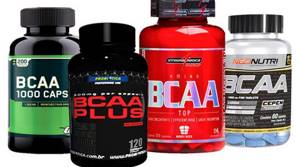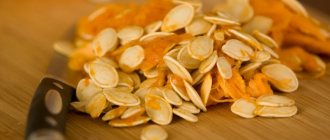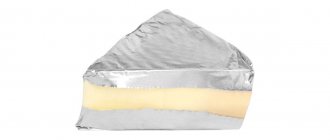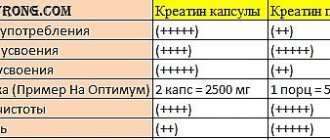Main varieties
Almost all types of sports nutrition are not drugs, but biologically active food supplements designed to complement the basic diet. Athletes need increased amounts of certain substances, and it is quite difficult to create an ideal set of everyday products. Ready-made supplements allow you to fill the gap without extra effort: they are available in the form of capsules and soluble powders for making cocktails. However, by themselves they do not guarantee results: strict adherence to the regime and regular physical activity will be required.
The following main classes of sports nutrition can be distinguished:
- Protein is a source of protein, which is a building material for increasing muscle mass. This is one of the most popular types of sports nutrition, it is popular among bodybuilders.
- Individual sets of amino acids. These are protein components; in an isolated state, they are absorbed faster and replenish the deficiency in the body.
- Gainers are energy cocktails high in protein and carbohydrates. They give a boost of energy and help restore wasted resources.
- Fat burners are drugs that help speed up metabolism and more quickly get rid of excess fat.
- Energy drinks are sources of carbohydrates that replenish energy reserves.
- Complexes of vitamins and minerals to ensure normal metabolism.
- Hormonal drugs with certain preventive properties.
The benefits and harms of sports nutrition largely depend on the correct choice and intake. Before you start taking any medications, you should definitely make sure there are no contraindications and consult with a trainer.
Facts about the harm of sports nutrition from an independent scientific laboratory
Below, as an illustration, are some facts from the independent laboratory ConsumerLab.com about the dangers of sports nutrition.
1 Hidden substances in sports nutrition
According to scientific research, it is the prohibited hidden ingredients (steroids, hormones, amphetamines) that most often cause harm to health when consuming sports nutrition.
A common practice is to add anabolic steroids, either explicitly or implicitly, to bodybuilding supplements.
This is done to ensure a quick “Wow!” effect in building muscle mass and losing weight.
Examples of the most popular synthetic steroids are methasterone and dimethazine .
What are the dangers of hidden ingredients?
Taking such supplements may, among other things, increase the risk of testicular cancer in men and cause liver damage .
Compared to men who had never used these supplements, the risk of developing testicular cancer was found to be 65% higher among those who had ever used them; 121% higher when used before age 25; by 156% - when used for more than 36 months; by 177% - when using two or more additives containing prohibited substances 1.
Another common outcome is liver dysfunction.
One scientific report notes the diagnosis of serious liver damage and hepatitis in 44 young athletes 4. As the reason, the researchers named anabolic steroids, which were contained in hidden form in sports supplements taken by athletes, i.e. were not clearly stated on the packaging.
At the same time, scientists note that the presence of hidden ingredients in sports nutrition for bodybuilding is common .
The main cause of harm in sports nutrition is most often prohibited hidden ingredients: steroids, stimulants, hormones. Their consumption significantly increases the risk of developing testicular cancer in men
Neither drug has been studied for harm during pregnancy or breastfeeding; Therefore, it is strictly not recommended to take them at this time.
We recommend : Sports pharmacology: consequences of use and side effects
2 “Natural” does not always mean “harmless”
Manufacturers of sports nutrition containing prohibited substances sometimes mislead by claiming that they are natural and derived from plants .
For example, the following ingredients are often added hidden to some sports nutrition products to enhance the effect (in particular, fat burners):
Read us on the networks
- aegeline stimulant : the manufacturer claims that it is made from Bengal Quince;
- DMAA (dimethylamylamine, 1.3 dimethylamylamine or methylhexanamine): the manufacturer states that it is made from Geranium;
- DMBA (1,3-dimethylbutylamine, 2-amino-4-methylpentane or 4-methyl-2-pentanamine and also labeled 4-amino-2-methylpentane citrate, AMP citrate, 1.3-dimethylbutylamine citrate, 4-amino-2- pentanamine, Pentergy, and 4-AMP): manufacturer states that it is made from Pouchung Tea;
- N-diethyl-phenylethylamine : the manufacturer states that it is made from the Dendrobium Orchid;
- BMPEA or beta-methylphenethylamine: The manufacturer states that it is made from Acacia rigidula.
Animal studies of the harms of these substances indicate that taking BMPEA may increase blood pressure and be accompanied by similar side effects to other amphetamine-like substances, the safety of which has not been studied in humans.
BMPEA was first registered by the US Food and Drug Administration in 2013 in weight loss, energy and mood supplements. Study 2 suggests that BMPEA is still on the market and is actively used by manufacturers, primarily in products containing Acacia rigidula.
In 2014, ConsumerLab.com researchers tested sports supplements available for purchase in online stores during the January-April 2014 time period that were labeled as containing Acacia rigidula. All of them were intended for weight loss, increasing athletic performance and mental activity. 11 of the 21 supplements—many from the same manufacturer—contained BMPEA in varying doses (ranging from 3 to 94 mg)2.
Supplements containing BMPEA included Aro Black Series Burn
(Vitacost),
Lipodrene Hardcore
(Hi-Tech Pharmaceuticals) and 9 others, including 2
Jet Fuel Superburn
(GAT) sports supplements.
Some of the products on this list, sold by Hi-Tech Pharmaceuticals, have been seized in the past for containing the illegal substance DMAA. Back then, DMAA and its analogue DMBA were also disguised on labels as plant extracts.
Laboratory studies have found that many weight loss and sports supplements contain the banned stimulant BMPEA.
We recommend : Anabolic steroids: consequences of use and side effects | Scientific facts
ConsumerLab experts recommend avoiding any sports nutrition product that contains any of the following prohibited ingredients , and opting for single-ingredient products rather than multi-ingredient products or those containing proprietary blends with unknown composition or that produce incredible muscle-building or weight-loss benefits.
| List of prohibited ingredients that pose a health hazard: |
| aegeline |
| DMAA (dimethylamylamine) |
| DMBA (dimethylbutylamine) |
| N-diethyl-phenylethylamine |
| BMPEA (beta-methylphenethylamine) |
| methasterone |
| dimethazine |
We recommend : Diuretics: side effects of use in bodybuilding
What are sports supplements made from?
High-quality dietary supplements from brands with a good reputation are made from ingredients of natural origin. Because of this, when taken in doses, they are no more harmful than regular food products, although they may be absorbed differently by the body and cause digestive problems at the beginning of use.
The following components can become raw materials for the production of various types of additives:
- Whey is the basis for the production of the popular whey protein. It is easily absorbed by the body and provides it with a large amount of protein.
- Soy. Soy vegetable protein is suitable for people with milk allergies and is also a popular choice for vegans.
- Milk is the raw material for the production of slowly digestible casein protein and various amino acids.
- Fructose, dextrose, maltadextrin are slow carbohydrates that are present in most carbohydrate cocktails.
- Vitamins and minerals obtained from plant extracts and other raw materials.
The products may also contain sweeteners, dyes and flavors in small quantities to give the product a pleasant taste. The packaging must contain information about the composition: this will ensure the absence of components that can cause allergies.
In low-quality dietary supplements, various copies and counterfeits of original products, you can find a large number of synthetic components of unknown origin; examination even revealed the presence of heavy metals. You should not skimp when choosing: if you want to get benefits for the body rather than harm, you should give preference to proven brands with a good reputation.
Main contraindications
Almost every type of sports nutrition has a certain set of contraindications:
- Eating large amounts of protein puts increased stress on the kidneys and liver. If you have diseases of these organs, there is a high risk of aggravating the situation.
- Energy drinks are strictly prohibited for people with heart and vascular diseases. Their long-term use can lead to hypertension and other problems.
- Gainers should not be taken by people with diabetes mellitus, as well as with other serious metabolic disorders in the body.
- Certain amino acids can cause increased stress on the gastrointestinal tract.
Additionally, some types of supplements may contain dangerous ingredients such as steroids or anabolic steroids. Their long-term use can lead to sexual dysfunction in men, cancer and other serious problems.
Safety of use also depends on the quality of the supplements themselves. If a manufacturer uses cheap, low-quality components, this can cause allergies, digestive disorders, and heartburn. Sports nutrition cannot be considered a complete replacement for regular food, but can only act as an additional component of the diet.
Sports nutrition: harm and benefit, composition and doctors’ opinions
The modern trend towards fitness and an athletic body leaves no chance for lazy and unfocused people. A sculpted back, six-pack abdominals, bulging triceps and deltoid muscles are all attributes of handsome and strong men.
Women are not far behind: it is more difficult for them to gain muscle mass, but they manage to achieve this in a short time. Sports nutrition has been at the peak of popularity for several years now. Amino acids, protein, gainer, creatine, steroids, testosterone... This world sucks in beginners like a black hole.
The benefits and harms of sports nutrition, reviews from doctors and athletes are presented in this article.
Types of sports nutrition
The modern market offers dozens of varieties for athletes. Different compositions and principles of action affect the results of taking supplements. The harm and benefits of sports nutrition may be less or greater, depending on the goals of training and the individual characteristics of the athlete’s body.
Its main varieties are as follows:
- Whey Protein. This is the same powder supplement that even people far from bodybuilding have heard about. Sold in beautiful bags with attractive inscriptions, it is a fine powder for dilution with water or milk. A serving contains all the essential amino acids. Whey protein is especially rich in essential amino acids, BCAA, leucine and cysteine (three times more than casein).
- Casein is also a granular protein, but only with a slightly different amino acid composition. Like whey protein, it contains about 20-24 grams of protein per serving. It takes a long time to digest: sometimes for six to seven hours.
- Branched chain amino acids (BCAs) are unique in that they are the only ones that are directly used by muscles as an energy source during exercise, so their stores can be depleted very quickly - this is their primary benefit. The harm of BCA sports nutrition and negative effects on the body are present only in the case of a serious overdose.
- Glutamine is an amino acid that is available separately in tablet form. Depending on the individual characteristics of the athlete, it can prevent the process of catabolism during intense training from 50 to 90%.
- Anabolic steroids and hormonal drugs in the literal sense of the word are not sports supplements, the harm and benefits of which can be assessed. Alas, many athletes, even at the amateur level, perceive such drugs as supplements. As a result, many of them remain infertile and are forced to undergo treatment for many years after the course.
Myths about protein and gainer
People who are far from professional bodybuilding and have never even bought a gym membership are still convinced that sports nutrition is harmful. The benefits and many arguments about the need to take it are empty words for them. Here are the most common myths about powdered sports nutrition:
- causes addiction;
- causes a decrease in potency;
- provokes diarrhea and diarrhea;
- interchangeable with baby food;
- provokes the development of neoplasms.
Of course, these are just rumors. Most types of sports nutrition are a harmless substitute for protein foods with preservatives, sweeteners, and flavorings.
Is it possible to replace sports nutrition at home?
You can only replace regular whey protein, and then only partially. For example, curd and kefir smoothies with berries are now in fashion.
Such cocktails really have a lot of protein in their composition. But compared to protein powders, they also contain fats and carbohydrates, the consumption of which is taboo for a cutting athlete. Therefore, such homemade cocktails and smoothies cannot be considered an equivalent alternative to sports nutrition.
Protein and gainer: what is it, harm and benefit
Gainer is the same as protein, only it contains a high amount of carbohydrates and is very high in calories. The average product contains about 80 grams of carbohydrates per serving and 30 grams of protein. Most gainers contain a large amount of vitamins and minerals.
This is an ideal choice for athletes looking to gain mass - this is the main benefit of sports nutrition. The harm and possible danger of a gainer is that due to excess carbohydrates, it is possible to gain not only muscle tissue, but also a significant layer of fat.
This possibility is especially great if the training is low-intensity - in this case, carbohydrates from the gainer will go straight to fat reserves.
Whey protein is a versatile supplement that contains about 24 grams of protein and about 10 grams of carbohydrates per serving.
Some manufacturers supply the market with pure protein without any admixture of carbohydrates and fats - such a product is more expensive, but it has more benefits. The harm of sports protein nutrition lies in the possibility of toxic effects on the kidneys.
People with diseases of the urinary system are allowed to take protein supplements only after consultation with a nephrologist.
Reviews from doctors and athletes about the use of protein
Feedback from athletes is positive: regular consumption of protein has helped hundreds of thousands of men and women around the world achieve their dream figure. In order to gain high-quality and dense muscle tissue, it is enough to regularly take enough protein and train properly.
Doctors are not so categorical and are in no hurry to sing enthusiastic odes to protein supplements. They warn: high doses of protein are toxic to the body, and if there is a tendency to kidney disease, they can even provoke the development of chronic renal failure.
Amino acids: benefits and harm to the body
Amino acids come in either tablet form or a sweet-tasting liquid. The main purpose of the intake is to instantly replenish nutrients that could prevent catabolism.
Amino acids can be replaceable and irreplaceable. Some of them enter the body with food, some are produced in the intestines. Human muscles are built from these substances. With their deficiency, which is observed during fasting, the process of catabolism begins - the body “eats” its own muscles. BCA sports nutrition works in a similar way and brings nutrition to muscles and benefits.
The harm of amino acids is the immediate absorption of high doses of protein. Yes, this is what prevents the processes of muscle tissue breakdown. Taken before training, such drugs promote hypertrophy of muscle tissue. But if a person is not in ideal health, high dosages of amino acids can cause damage to the liver and kidneys.
Reviews from gym regulars about amino acids
Most athletes prefer amino acids from domestic manufacturers. Reviews indicate that there is no difference in action between expensive and cheap tablets. Expensive complexes are most often also enriched with vitamins.
The domestic company Ironman offers to purchase a universal amino acid complex, which includes all essential amino acids. For a beginner, such a product will be quite enough. More experienced athletes prefer to opt for more expensive complexes, which include vitamins and minerals.
What are anabolic steroids and why are they taken?
This is a special class of drugs, most often their effect is a hormonal effect on the body. Many amateur athletes take steroids in order to achieve maximum hypertrophy of muscle tissue as quickly as possible.
Those same “terrifying” bodybuilders that we see in photographs from professional competitions are almost all taking serious courses of anabolic steroids. They do this in order to achieve fame, fame in wide circles and money. But why ordinary guys use steroids is a mystery.
The fact remains that every third gym goer is on anabolic steroids.
There are several forms of release - injections, tablets, capsules. Almost all drugs are based on testosterone - it is the high content of this male sex hormone in the blood that causes muscles to grow very quickly. In just a month of regular use of anabolic steroids and proper training, you can add from three to six kilograms of muscle mass.
Testosterone: harm and benefit, reviews from athletes
There is no hormone-based sports nutrition. Anything that contains testosterone, androgens and other male sex hormones in non-medicinal concentrations is classified as anabolic steroids.
Such tablets and ampoules for intramuscular administration are considered potent substances. Their distribution is prohibited and criminally prosecuted. These include testosterone.
Sports nutrition, the harms and benefits of which have long been studied, has nothing to do with anabolic steroids.
The harm of steroids is enormous: after a month on the course, the production of your own hormones decreases. The body has no need to work - after all, hormones come from outside. Almost all men develop gynecomastia. As a result, in order to bring the hormonal balance back to normal, so-called post-cycle therapy is required after the course.
Reviews from athletes about such tablets and injections are mixed. Some people irrevocably ruined their health with such supplements, while others were able to achieve their dream body thanks to them.
Growth hormone in bodybuilding
Injectable growth hormone is not a prohibited drug. It can be purchased at any pharmacy. This substance can reduce subcutaneous fat fiber to a minimum, ensure hypertrophy of muscle fibers, give the athlete vigor, performance, and a youthful appearance, but at the same time cause a slight psychological dependence - such are the benefits and harms of sports nutrition.
Doctors are generally reluctant to prescribe growth hormone to adults. It has one very serious side effect: despite its miraculous effect, it can provoke the growth of tumors and neoplasms, since under its influence everything in the body grows - not only muscles, but also polyps, tumors, etc.
Women love to use growth hormone because of its ability to quickly get rid of fat and rejuvenate the body.
Sports nutrition – harm or benefit? Doctors' opinion
It is definitely difficult to answer this question. In some cases, a few months of regular intake of high doses of protein is enough to impair kidney function - this is the danger and harm of sports nutrition.
The benefit of protein is to compensate for protein deficiency. This is an ideal replacement for those who, for ethical reasons, refuse to eat meat.
Or is underweight - in this case, not only protein, but also a gainer will help.
The opinions of doctors confirm that the harm and benefit of any sports nutrition (SNA) may be unpredictable. It doesn’t matter what exactly a person consumes - protein, gainer, amino acids, etc. In rare cases, the body may produce an unexpected reaction.
For example, high doses of protein may be too toxic for the liver, and this will provoke toxic hepatitis. But more often the kidneys cannot cope with the load. If a person has a history of chronic pyelonephritis or glomerulonephritis, then high doses of protein in the diet can trigger the development of chronic renal failure.
Source: https://fb.ru/article/400908/sportivnoe-pitanie-vred-i-polza-sostav-i-mneniya-vrachey
Rules of use
Any sports dietary supplements can be taken without harm to human health only if the instructions are strictly followed. When used correctly, they help you achieve your goal faster: lose weight, rid the body of unnecessary fat reserves and ensure faster growth of muscle mass. Professional athletes take supplements when actively preparing for competitions, as they help reduce stress and speed up the body's recovery.
To minimize possible negative impacts, several important rules must be followed:
- It is not recommended to take several supplements at the same time if they duplicate each other in action. It is better to give preference to a product from one manufacturer.
- Do not take the full daily dose at one time. It needs to be divided into several portions, the intake is consistent with the training and rest regime.
- The dose taken should not exceed the natural needs of the body. For example, the daily amount of protein in the diet should be 1.5-2 g for men and 1-1.5 g for women per 1 kg of weight.
- Make sure to eat enough fiber. It is found in large quantities in vegetables and fruits.
- The total duration of taking dietary supplements should not exceed 3 months. After this, it is recommended to take a long break from use.
Most myths about the ineffectiveness of sports nutrition arise precisely because of their incorrect use. Without intense training, not a single fat burner will produce results, and simply consuming protein without regular muscle load will not help build muscle, i.e. you should know how they work.
Types and purposes of sports nutrition
Sports nutrition is a food supplement to an athlete’s basic diet that helps restore strength spent during training, build muscle mass and strength, burn excess weight, help concentrate on training, increase immunity, strengthen ligaments and tendons, and generally give what a person deserves while training in the gym or anywhere else.
Without a complete, balanced diet and recovery, results can be forgotten in sports, despite taking high-quality sports supplements and properly designed workouts.
Let's list the most basic, common sports supplements that you can find on the shelves of sports nutrition stores in your city or on the Internet.
Protein
High-protein mixtures obtained from milk; the quality of the protein directly depends on the method of its preparation. Without sufficient protein (protein), muscle growth is not possible. Therefore, this sports supplement is recommended for any athlete as a means of increasing muscle mass with adequate strength training in the gym.

Protein provides a positive nitrogen balance in the body, which makes muscle growth possible.
Gainer
A protein-carbohydrate mixture, the drink is recommended for people with a thin build (pronounced ectomorphs) and those who find it difficult to gain weight. Well restores energy reserves that were spent during training.
Due to the high calorie content of the gainer, it is contraindicated for people who want to lose fat.
Amino acids
The same protein, only already broken down into amino acids, is very quickly absorbed into the blood. The main disadvantage of amino acids in free form is the high cost; if you look at the composition, one tablet contains 3-4 grams of protein, it is not difficult to calculate how much protein there will be and compare it with a regular can of protein.
Therefore, it is more expedient and more economical to buy regular, complex protein in cans. Of course, if your budget allows you to buy them, then feel free to buy them, because it is more convenient and effective.
Essential branched chain amino acids (leucine, isoleucine, valine). Our muscles are made up of proteins (amino acids), of which about 35% are bcaa amino acids. In addition, these three essential amino acids have an anti-catabolic effect on muscles during and after exercise.
Therefore, bcaa can be used both before, during and after training in the gym. It is also recommended to use bcaa to quickly restore strength after hard training. However, the high cost of these amino acids does not make it as popular as protein.
Arginine
An irreplaceable acid, it is used by athletes as a nitrogen donor (vasodilator effect, which gives a “pump”, muscle pumping effect). In addition, this supplement is used in bodybuilding for the purpose of speedy recovery, healing of muscle microtraumas received during training, as well as to remove toxins from the body and stimulate the production of growth hormone.
To this day, there is still ongoing debate about the real effectiveness of arginine in sports.
Glutamine
A conditionally essential amino acid, which makes up 60% of muscles, which is why it is so popular in bodybuilding for building muscle mass.
In addition, glutamine reduces the release of cortisol, which has a destructive effect on muscles, and strengthens the immune system (on days of active training, when the body gets sick, the level of glutamine in the blood inevitably drops).
They correct the level of sex hormones, help increase libido, increase muscle mass and strength. The main effect is due to stimulation of the secretion of the male sex hormone testosterone.
Glutamine from AllMax Nutrition

This supplement is popular among athletes of age categories (after 30 years), when the level of their own testosterone decreases, as well as among “chemist” athletes, who successfully use it to competently exit the course (preventing the “rollback phenomenon”).
Fat burners
A sports supplement that accelerates metabolism, suppresses appetite, and reduces the absorption of fats and carbohydrates from the digestive tract.
The most effective among them are thermogenics (increase energy consumption in the body, suppress appetite, which ultimately leads to fat burning), which cannot be said about lipotropics, which are designed to speed up metabolism, due to which there is an active burning of excess weight (90% of them in practice does not work).
Testosterone booster
In addition, there are supplements that block calories or nutrients from the gastrointestinal tract.
Creatine
A nitrogen-containing carboxylic acid, it is deposited primarily in muscles in the form of creatine phosphate.
It is designed to increase strength and muscle mass, and is directly involved in the energy metabolism of cells.
During strength training, the body primarily uses creatine (the first 10-20 seconds of work) and glycogen, so taking this supplement is very advisable, especially for strength sports.
The best way to take creatine is immediately after a workout, as well as the next morning, along with juice or another sweet drink, so that your sugar levels jump, insulin is released, and the creatine is delivered to the right place.
Creatine monohydrate from BioTech
Stimulants of the central nervous system help to train more energetically, often when taking this supplement there is a “pump” effect, an increase in endurance and muscle recovery ability. Manufacturers often include:
- Arginine
- Vitamins and minerals
- Caffeine
- Taurine
- Beta-alanine
- Creatine
Pre-workout complex from APS
This supplement is not recommended for use by people who suffer from heart failure or have problems with blood pressure.
They protect the athlete’s body from various viruses when the immune system weakens after training, and also strengthen ligaments, tendons, and maintain the general condition of the athlete. It is better to buy pharmacy complexes, since their quality will be much higher, but it is worth remembering that you will simply flush the excess vitamins down the toilet.
Before giving preference to one or another brand of sports nutrition, you must adhere to the basic principles when choosing it:
- manufacturer (foreign supplements are much higher quality and more reliable, but their price is much higher than that of domestic sports nutrition)
- price (depending on your financial situation, choose a suitable supplement for yourself, but it is worth remembering that there are brands with unreasonably inflated prices, for example MuscleTech)
- reviews on the Internet (before buying, read real comments from people who have already tried the supplement you have chosen so that your money does not go down the drain)
- goals (you need to clearly know what you want to get from the supplement, burning fat/increasing strength/mass, etc.)
- composition (read carefully the composition of the product, what ingredients the supplement consists of, if it is a protein, then how much protein is in one serving and what amino acids, if it is a pre-workout complex, then due to what substances the muscle pump occurs, the central nervous system is stimulated, and so on)
Is it possible to lose weight with sports nutrition?

While men strive to build muscle mass, women more often purchase dietary supplements in order to lose excess weight. It is important to understand that this is only an auxiliary component: it will only help in combination with proper nutrition and physical activity.
For proper nutrition, manufacturers have developed a number of dietary supplements:
- There are several types of fat burners. They contain omega-3, caffeine, L-carnitine, guarana extract and other components that activate metabolism, which contributes to the accelerated breakdown of fat cells and the release of energy.
- Protein shakes and amino acid complexes. They contain virtually no fat, so they do not lead to the growth of fatty deposits.
- Vitamins and minerals. Strict mono-diets deprive the body of essential substances, so their quantity must be additionally replenished.
However, all weight loss supplements work only in combination with a properly structured training and rest regime, as well as a thoughtful diet. To lose weight, you need to give up high-calorie foods, avoid eating sweets, flour, junk food, soda, etc. If you do not give the body physical activity, the protein taken will inevitably turn into fat, the result will be the opposite of the desired one.
It is not advisable for those losing weight to take weight gainers because of their high calorie content. The same goes for all kinds of “energy” bars and mixtures: they cause a rapid increase in blood sugar levels and can lead to unpleasant consequences for the body.
How to avoid harm from sports nutrition: recommendations
Do not trust the recommendations and statements of persons incompetent in the field of sports nutrition
Do not trust what ordinary consumers advise and tell you, no matter how impressive their dimensions, sellers of specialized sports nutrition stores, and, especially, the media, etc.
In order to emphasize the importance of the issue, we will illustrate the situation with an illustrative example given by Professor Dan Benardot in his book “Advanced sport nutrition”. This is a real fact.
“Recently, water researchers have suggested that large amounts of water consumed by untrained runners during a marathon may increase the risk of death during the race.
The result of this particular study was presented in the media as saying that it is dangerous for a person to drink too much water as it can lead to death. Then the fantasies continued and they suggested that the risk from insufficient water consumption was much less serious.
Obviously, the conclusion presented in the newspapers is far from the one the researchers came to. Not all fluids are water, not all events last four hours, and well-trained athletes have different sweat rates compared to poorly trained athletes, so their fluid needs are different.
The incorrect wording has resulted in many athletes who rely on the press being exposed to the risk of dehydration and possible cardiac arrest due to reduced water intake.”
This example well illustrates the fact in which the statements of even authoritative sources can reach us after repeated interpretation in their own way by sellers, athletes and even manufacturers, and the importance of our own balanced approach to the issue.
We recommend : Is protein harmful to health? Scientific facts
Question and verify brand claims
We are talking about the biased opinion of sellers and marketers, whose goal and meaning in life is to make a profit. We have already touched on this issue above.
Be skeptical of the results of “scientific” research by scientists who are “fed” by large companies or are hired by them
Trust scientific facts from independent experts who are not interested in falsifying results
For example, in the USA there are several independent scientific laboratories that regularly monitor the quality of various types of sports and nutritional supplements. One of them is ConsumerLab.com. She has a lot of facts about discovering the harm of sports nutrition.
Examine.com is another independent science portal that aims to examine what scientific research says about the benefits and harms of various drugs and supplements. They also do not sell anything and are not interested in falsifying facts.
In our materials on promusculus.ru, we often use facts from the pages of these two portals, as well as directly from scientific sources, trying to present the most objective point of view.
Check the reputation of the sports nutrition brand you choose
We have already said that the sports nutrition market is beyond the control of the competent authorities.
There is no guarantee that everything that is written on the packaging of a sports supplement is actually contained there and in the indicated quantities. It is equally likely that there may be more, less, or even no “active ingredients” at all.
Likewise, the supplement may contain substances not listed on the packaging . And this situation deserves the greatest concern.
Cases of such discrepancy are more common than they seem and often lead to positive doping tests in professional athletes. In such situations, an apology in the form of “Forgive me. I didn’t know...” doesn’t work.
Further - more: ingredients that are “accidentally” not declared by the manufacturer very often cause serious health problems and even deaths. We have already talked about this too.
For large sports nutrition brands, such manipulations are fraught with loss of reputation and loss in fierce competition. It is unlikely that any of them will allow a compromise between customer trust and the desire to make money by any means necessary.
Most often, evidence of harm to sports nutrition due to the content of prohibited ingredients is typical for unknown fly-by-night companies.
Identify a list of reputable brands and carefully control everything you consume.
Large brands of sports nutrition can be trusted: few of them will take the step of deceiving customers, as this is fraught with loss of reputation and trust
We recommend: Protein bars: benefits and harm. Reviews from doctors and scientists
How to avoid the negative consequences of consumption?
One of the important rules is that you should not save on buying sports nutrition. Too low a price is a sure sign of low quality, since the manufacturer will have to save on raw materials. Any dietary supplements should be taken only if there are specific indications for use: for example, overweight or significant strength loads to build muscles.
To prevent harm to your body, do not forget about the following requirements:
- Buy sports nutrition only in specialized stores and on trusted websites. If there are any doubts about the quality, it is better to refuse the purchase.
- Dietary supplements are taken as an addition to the regular diet, and not as a complete replacement. In addition to protein, the diet should include a sufficient amount of fiber, healthy fats, vitamins, and other components necessary for the body.
- If any negative side reactions or signs of allergy occur, you must immediately stop taking dietary supplements.
- You need to be careful when using fat burners - such dietary supplements provoke an increase in body temperature and can cause headaches. They require high physical activity to expend the released energy.
It is prohibited to take anabolic steroids. There is no safe dose for these substances; taking them will certainly lead to negative health consequences.










